By: Izumi Hasegawa September 20, 2017
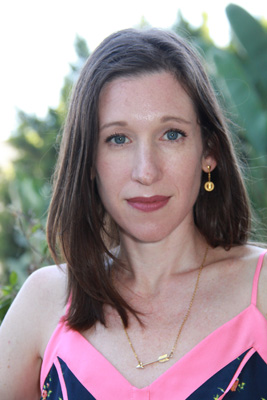
There was a time that Lauren Kate, bestseller novelist of Fallen thought it would never happen for her. However, with the continuous delivery of rejection letters and in between being a wife and Mom, she also stayed determined. We chat with Lauren exclusively on how she built her career as novelist.
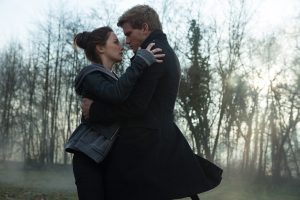 Q: Before you were a best selling novelist, you were unknown to the publishing world. Can you share how you pitched your work and made it happen for yourself?
Q: Before you were a best selling novelist, you were unknown to the publishing world. Can you share how you pitched your work and made it happen for yourself?
You know, it was done by my agent at the time. I just wrote the story. I didn’t have a sense, I had written, before these books I had written two other novels that each one took me 5 years to write. And none of them were ever published. And I thought that the same situation was going to happen with Fallen. I thought I would write it, and I would struggle through it, and I would care a lot about it. And then, and then it would just end up a dusty file in my hard drive. I didn’t have any expectations of it becoming a book, let alone one that anyone wanted to read. So it’s been a very surprising journey for me, from start to finish. And I think that, it’s hard for me to articulate why people connected with it because I think there are a lot of differences, different readers connect to stories for different reasons. But I know that I am always game for a really powerful love story. So that’s, I guess what I was trying to put out there.
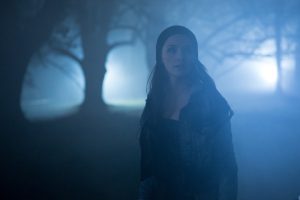 Q: How did you find an agent that would take you on? I understand you had a few rejections before you were signed.
Q: How did you find an agent that would take you on? I understand you had a few rejections before you were signed.
Yeah, I have so many. I have a box under my bed somewhere with 67 rejection letters that I just got back to back to, all I got was rejection for years and years. It only takes one person to say yes and open up the door. And then, who knows.
Q: For the young people that want to be novelists, would your advice be the power through the rejections and keep reaching out to agents?
Yes absolutely. Rejection is part of the business. Even today, it’s part of it for me, I had it yesterday. It happens still all the time. So I think.
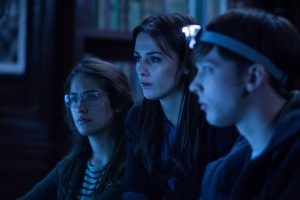 Q: Even you?
Q: Even you?
Yeah. So I think it’s something you have to not get used to but not be surprised by. And just keep going, keep going with your stories and keep trying.
Q: It is almost like actors!
Yeah, I mean talking to Addison (Timlin, who played Lucinda in Fallen) and Harrison (Gilbertson, who played Cam) throughout this process I think that there are a lot of similarities. And the joys and the heartbreaks of an artistic life
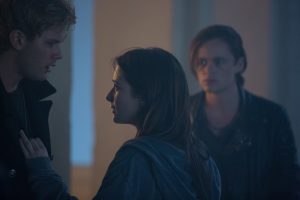 Q: How do you keep going after all the rejection letters?
Q: How do you keep going after all the rejection letters?
Sometimes I quit. Sometimes I still want to quit. But I think that what got me into this, if it is a business, what got me into it is just a need to tell stories. That’s just the way my mind operates. And it’s kind of a compulsion to put them down, write them down, in some way. So even the times when I’ve quit before and I’ve said I’ve been rejected too many times. I can’t handle another one, I can’t merit. You know three months later, I’m waking up in the middle of the night with a story I have to write. So that’s how I keep going. It’s just the stories themselves.
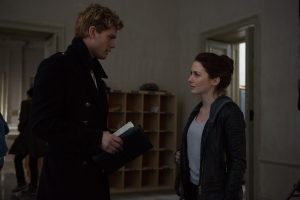 Q: What did you do before that? Between graduating university and becoming a New York Times best seller, what did you do and how did you support yourself?
Q: What did you do before that? Between graduating university and becoming a New York Times best seller, what did you do and how did you support yourself?
Right out of college I moved to New York and I wanted to work in publishing. I wanted to see the other side of the business. And I after a long time, got a job as an editor at HarperCollins. So I worked in publishing as an editor acquiring other people’s novels and editing them and seeing how that went. And then I went to graduate school in California and “Fallen” kind of came out of my experience there. But I think that those years working, I worked for five years at HarperCollins. And I think that that experience made me a lot calmer when it came to my own publishing because I knew, “Okay, now this is what the art departments going to do. And they’re going to expect this kind of collaboration and they’re going to want this kind of space to do their own creative work. And have to let them come up with a cover. It’s not your job to come up with the cover.” So I think it made me embrace the collaborative nature of publishing. Because writing obviously is so solitary you’re just on your own. And as soon as the book is at the publisher it becomes this household thing that, you’re in a family with other people. And I think that that collaboration is something I really look forward to with each book. And I enjoy very much.
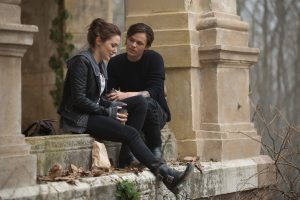 Q: When did you decide you wanted to be a novelist?
Q: When did you decide you wanted to be a novelist?
In college. Writing is something that I’ve always done. But I was not raised in a family or a community that knew how to support artists. I didn’t know any artists when I was growing up. I didn’t know any creative adults who did that for a living. And so it was always presented to me by my family and even by teachers as writing is something you do as a kid and then you use your writing skills to have a real job. Like be a lawyer or whatever. So I took my first creative writing class when I was a freshman in college and it was a really simple experience of just meeting the professor and having him hold up his book with his name on it. And I’d never met a writer before. I go to schools all the time now and talk to students about writing books and all of that. And I never had that experience as a kid. So I didn’t really know it was possible. But from the moment I did know it was possible. I knew it was what I wanted to do.
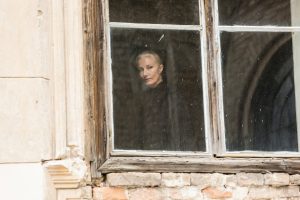 Q: How do you write and juggle your personal life as a mom and wife?
Q: How do you write and juggle your personal life as a mom and wife?
[Laughs] I don’t, I don’t think it’s possible. It is, those questions take up a lot of my consciousness. Where am I putting the most energy and is it the right place to put it? My kids are really little, they are three and four. And they’re just going to school for the first time this year. So I don’t know, I don’t have an answer. I certainly don’t do it well.
Q: Do you have any type of set schedule? Like from 9 to 10 I write?
Yeah, yeah, yeah. I mean I try to do it during the day, I am best. So kind of mid-morning through the afternoon I try to do it. And there’s a lot of interruptions because my kids are around. But I think it’s really hard to schedule creativity, but its a necessity for me because otherwise all these other interests and obligations can swallow it up. So you have to schedule it the way you schedule time with a friend. Like we have plans today, we’re having brunch. From 10 to 1, I am going to be writing. But yeah, I don’t have the answer, it’s hard.
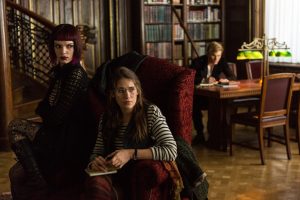 Q: So what did you do discover when you became a mother?
Q: So what did you do discover when you became a mother?
Yeah. I have been very surprised how maternal I am. Because it’s not a side of myself I have ever seen until my children were born. And I was not expecting to really know what to do with them. And I’m surprised by how natural it is. And fun. And that the challenges of it are just that. They don’t, I don’t know. I have an intuition that I trust, that I think is more solid than a lot of, in a lot of other areas of my life. I can second guess myself all day about my writing, but when it comes to my family, I feel like I often know what to do. I know what’s best for them and what decision to make.
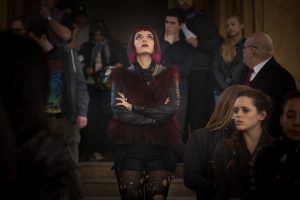 Q: So in the future, will you write some story about a mom?
Q: So in the future, will you write some story about a mom?
My next book is actually coming up, and, next summer. And it is about a mother who has been separated from her daughter and is trying to get her back.
Q: So based on your own experience?
Yeah I think I felt. You know, I’ve been working on this book for three years and my kids are three and four. So I think I felt when my kids were very little. Or my son wasn’t even born yet, my daughter was little. I don’t think, I’ve always thought of myself as a love story writer. It was the only thing I wanted to write about, the only thing I felt I could write about was motherhood. And so it’s a love story and a motherhood story.
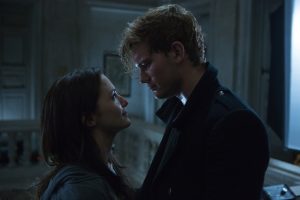 Q: What inspires you to write about love and romance?
Q: What inspires you to write about love and romance?
I think love is the reason we’re here. And I think it’s the most important thing in the world. And I’m just drawn to those stories and I want to tell them.
Q: Did you have any favorite love stories when you were a child? Or when you decided to be a writer, did you think, “I have to read as many as possible?”
Yeah. I like doomed love stories. I mean, I love “The Great Gatsby.” I love the love aspects of “The Great Gatsby.” I was really moved by “The Year of the Magical Thinking,” which is like a posthumous love story. But yeah I like love stories that there’s a really sad component to. Except in real life.
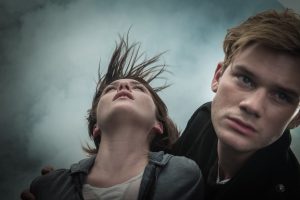 Q: So what did you learn from international book tour?
Q: So what did you learn from international book tour?
Well I think what’s been particularly fascinating is the books have to deal with god and religion. So that brings out, brings out or doesn’t bring out different things in different cultures.
You know, I found that when I go to Catholic countries like South America. I go to Brazil, they’re open embrasure of angels and all things that are angelic because of their innate devotion to Catholicism, it just propels them into being interested in this kind of story. Whereas, places like the Netherlands, they are very secular. And so they have a lot of intellectual concerns about what good and evil are. What heaven and hell are. They can still be drawn to the love story, but it’s a completely different, they read the books in really different ways. So that’s been fascinating for me to get to see the way it’s received in different parts of the world.
Fallen is currently playing in theatres worldwide.
For more info, visit the film series’ official Facebook page at,
https://www.facebook.com/TheFallenSeries/
Interview by Izumi Hasegawa – @HNW_Izumi
Edited by: Jody Taylor – @RealJodyTaylor
Follow Us: What’s Up Hollywood at @WhatsUpHWood
